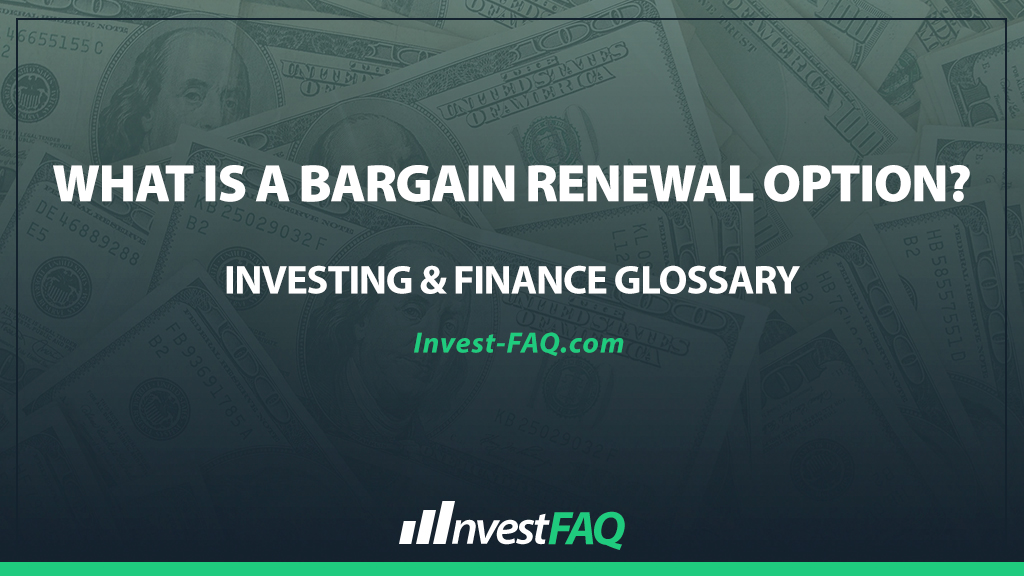
Bargain Renewal Option
Contents
A bargain renewal option is a provision in a lease agreement that allows the lessee to extend the lease term at a rate significantly lower than the expected market rate at the time of renewal. This option provides financial predictability and potential savings for the lessee, while offering the lessor long-term occupancy of their asset.
In the business realm, a bargain renewal option is particularly valuable for companies looking to maintain operational stability without the financial burden of significant rent increases.
This is common in commercial real estate leases where businesses, such as retail stores or offices, wish to secure their location for an extended period while controlling costs.
It allows companies to plan for the future with greater certainty regarding one of their primary expenses: occupancy costs.
Example of a Bargain Renewal Option
Let’s consider “Downtown Café,” which leases its café space with a five-year term and includes a bargain renewal option to extend the lease for another five years at a rate 20% below the anticipated market price.
Assume the market rate for similar properties is expected to be $10,000 per month at the time of renewal, but due to the bargain renewal option, Downtown Café will only pay $8,000 per month.
For accounting purposes, Downtown Café would assess the likelihood of exercising the bargain renewal option at the lease’s inception and, if considered likely, account for the lease liability and right-of-use asset over the extended lease term, reflecting the discounted rate in their financial statements.
In this scenario, the bargain renewal option presents a significant financial advantage for Downtown Café by reducing its future rental expenses.
The accounting treatment ensures that the financial statements accurately reflect the commitment to lease the property under potentially favorable terms, which affects both the valuation of the lease liability and the right-of-use asset.
This approach provides a more comprehensive view of the café’s future financial obligations and benefits, aiding in better financial planning and performance analysis.
Significance for Investing & Finance
The concept of a bargain renewal option holds significant importance in accounting for several reasons:
Financial Planning: It allows businesses to anticipate and manage future costs more effectively, contributing to long-term financial stability.
Lease Valuation: Accurately accounting for bargain renewal options ensures that lease liabilities and right-of-use assets are correctly valued on the balance sheet, reflecting the lessee’s financial position and obligations.
Strategic Decision-Making: Understanding the financial implications of bargain renewal options helps companies make informed strategic decisions regarding lease agreements and long-term operational planning.
Compliance with Accounting Standards: Proper accounting for lease agreements, including bargain renewal options, is crucial for compliance with accounting standards such as IFRS 16 and ASC 842, which require lessees to recognize leases on their balance sheets.
In summary, a bargain renewal option is a strategic provision in lease agreements that can offer significant financial benefits to lessees.
Properly accounting for these options is crucial for accurate financial reporting, compliance with accounting standards, and effective long-term planning.
Businesses leverage these options to secure favorable lease terms, ensuring operational stability and cost control.
FAQ
How does a bargain renewal option impact a company’s lease accounting?
A bargain renewal option impacts lease accounting by requiring the lessee to potentially recognize a lease liability and right-of-use asset at a discounted rate for the renewal period if the renewal is reasonably certain, affecting both the balance sheet and expenses recognized over the lease term.
What factors should a company consider before exercising a bargain renewal option?
Before exercising a bargain renewal option, a company should evaluate the current market conditions, the anticipated future use of the leased asset, and the financial benefits of the discounted renewal rate compared to potential relocation or renegotiation costs.
Can the existence of a bargain renewal option affect lease negotiations?
Yes, the existence of a bargain renewal option can significantly affect lease negotiations by providing the lessee with leverage to secure favorable terms for future periods, potentially influencing the initial lease terms and overall relationship with the lessor.
How do bargain renewal options benefit lessees in a fluctuating real estate market?
In a fluctuating real estate market, bargain renewal options benefit lessees by locking in lower-than-market rental rates for the renewal period, offering cost savings and financial predictability regardless of market conditions.
